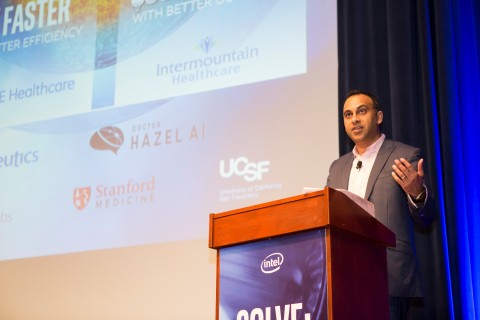Recent Progress with Intel-Powered Solutions Shows Artificial Intelligence Is Good Medicine.
SAN FRANCISCO — (BUSINESS WIRE) — March 21, 2018 — The following is an opinion editorial provided by Navin Shenoy, executive vice president and general manager of the Data Center Group at Intel Corporation.
This press release features multimedia. View the full release here: https://www.businesswire.com/news/home/20180321006119/en/

Navin Shenoy, executive vice president and general manager of the Data Center Group at Intel Corporation, speaks Wednesday, March 21, 2018, at the University of California, San Francisco. Intel invited leading healthcare organizations to address the most pressing topics and challenges in healthcare. (Credit: Intel Corporation)
In the wide world of big data, artificial intelligence (AI) holds transformational promise. Everything from manufacturing to transportation to retail to education will be improved through its application. But nowhere is that potential more profound than in healthcare, where every one of us has a stake.
What if we could predict the next big disease epidemic, and stop it before it kills? What if we could look at zettabytes of data to find those at greatest risk of becoming sick, then quickly and precisely prevent that from happening? What if the treatment and management of chronic disease could be so personalized that no two individuals get the same medicine, but equally enjoy the best possible outcome? What if we could drastically reduce the time and cost to discover new drugs and bring them on the market? What if we could do all of that now?
Thanks to artificial intelligence and the work of Intel and its partners, we can.
Real Impact Today
There’s a common myth that AI in healthcare is the stuff of science fiction – think machines diagnosing illness and prescribing treatment without a doctor involved. But that is not only highly unlikely, it’s not even close to the best examples of how AI is emerging in healthcare today.
Intel and partners throughout the healthcare industry – including GE Healthcare, Siemens, Sharp Healthcare, the Broad Institute, UCSF and the Mayo Clinic – are successfully applying AI solutions today, from the back office to the doctor’s office, from the emergency room to the living room. A few customers that we’re working closely with include:
Montefiore Medical System: using prescriptive models to identify patients at risk for respiratory failure, so healthcare workers can act on alerts that lead to timely interventions that save lives and resources.
Stanford Medical: using AI to augment MRI image reconstruction so that a complete image can be delivered in about a minute versus what normally would take about an hour – eliminating risky intubation and sedation in pediatric patients during imaging exams.
ICON plc: Instead of only relying on burdensome clinic visits and paper diaries, using clinical data from sensors and wearable devices to more quickly assess the impact of new therapies in clinical trials.
AccuHealth: Using home monitoring along with data mining and predictive modeling to identify changes of concern among chronic disease patients to enable intervention before conditions escalate and become acute.
Better Health Tomorrow
But the triumph of artificial intelligence in healthcare isn’t inevitable. Right now, the average hospital generates 665 terabytes of data annually,1 but most of that data isn’t useful. At least 80 percent of hospital data is unstructured,2 such as clinical notes, video and images. Electronic medical records (EMRs) are a mandated system of record, but they aren’t as actionable as they could be. Only with AI can we leverage healthcare data to create a system of insights.
Getting healthcare systems to provide greater access to their data would help. Government also has a role to play by providing appropriate incentives and regulatory clarity for sharing data. We agree with the recent White House proposal to give patients control and ownership of all their health data, bringing it with them wherever they go rather than residing in various doctor’s offices, clinics and hospitals.
New technology can help as well. One example: Intel researchers are making great strides toward practical methods for homomorphic encryption, a method that will allow computer systems to perform calculations on encrypted information without decrypting it first. Such encryption would enable researchers to operate on data in a secure and private way, while still delivering insightful results.
Indeed, much work is ahead, and Intel is
uniquely
positioned to help healthcare organizations succeed. Emerging
healthcare data is massive data – images, a growing list of ‘omics (i.e.
genomics, proteomics), video – and will require a storage plan and a
network that addresses speed, latency and reliability. We have been
investing with our partners to build the right systems - data, storage,
network, full infrastructure – all the way from the edge to the network
to the cloud, and everywhere in between. With the advancements in our
hardware and optimizations of popular deep learning frameworks, the
Intel Xeon Scalable processor has 198x better inference performance and
127x better training performance than prior generations <









